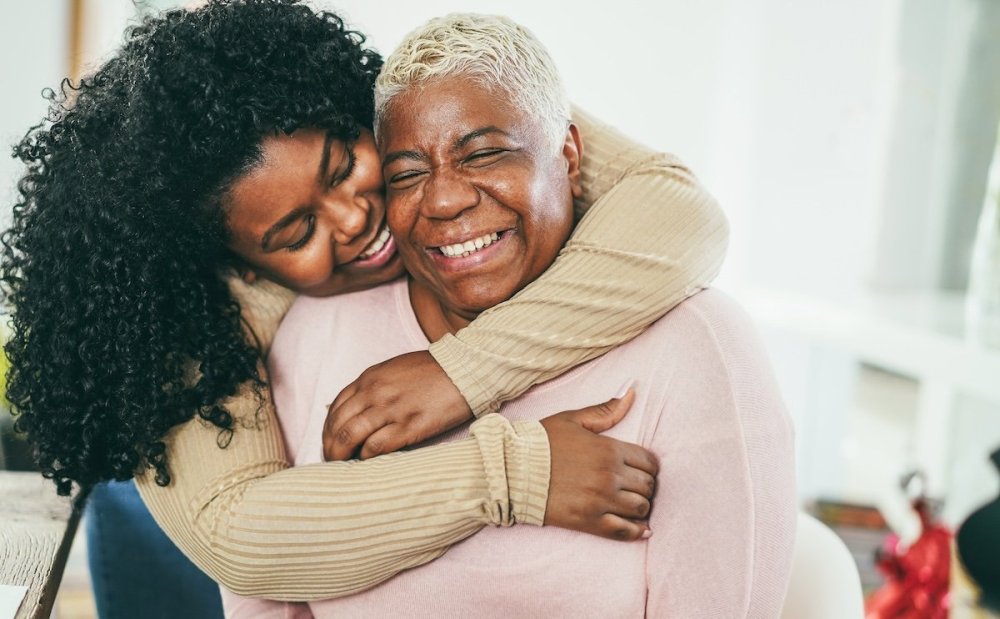The pandemic put a stop to embracing friends and family. But the power of a hugging is real. With annual National Hug Day on 21 January, Dee Marques explores the psychology of hugging with seven science-backed reasons why we all should embrace, well, embracing more.
'Sometimes, you just need a hug'. This may be one of the most repeated sayings of popular wisdom, but, in fact, the psychology of hugging shows there's much truth in this statement, meaning we should all celebrate National Hugging Day. During the coronavirus pandemic, embracing friends, family or loved-ones was strongly discouraged, contributing to increased levels of depression and anxiety.
Post-pandemic, many of us have realised just how important personal affection and touch is. During 'regular' life, in our pursuit of happiness we usually focus on things like personal development, health and relationships with others. But sometimes, we place too much importance on long-term goals, and we overlook the power of smaller but equally effective things. One of those things is the hugging and embrace, and how this gesture contributes to our overall well-being.

Hug yourself happy: Never underestimate the power of embrace
In fact, science shows that giving or receiving a hug can do wonders for our mood. When stress piles up and life gets tough, the physical embrace of a hug or cuddle can be way more powerful than any words of encouragement. And there’s a reason for that: as humans, we are wired to respond to touch, and there’s a strong connection between touch and emotion.
7 benefits of hugging
Embracing friends and family – even strangers – is a powerful healing tool, so we encourage you to enjoy it – not just on National Hugging Day, but every day.
1. Stress and pain reduction
One of the most obvious benefits of hugging is stress reduction. You only need to think about how much of a relief you feel when you’re upset and receive a genuine cuddle from a friend. Science confirms this: a 2010 study from the University of California, Los Angeles, found that participants were better able to cope with physical pain and stress related to unpleasant situations if they were arm-in-arm with their partners.
MORE LIKE THIS:
- Feel Stress-Free Fast: 11 Science-Backed Techniques
- What is Pebbling? What Penguins Can Teach Us About Stronger Relationships
- Why Does Laughing During Sex Signify a Great Relationship?
More recent research from 2018 suggests that hugs act as a buffer against negative experiences. Michael L. M. Murphy, Denise Janicki-Deverts, and Sheldon Cohen from the University of Pittsburgh carried out a study involving around 400 adults. The results showed that unhappy or negative experiences – the kind that might normally ruin our day – actually become much easier to deal with when we receive a hug from a loved one.
2. Reduced anxiety and fear
The negative effects of fear, anxiety and low self-esteem can also be reduced by the power of a hug. In fact, research from the VU University Amsterdam has found this to be true even when a hug is reduced to a one-second pat on the back or to touching an inanimate object, such as a teddy bear. “Even fleeting and seemingly trivial instances of interpersonal touch may help people to deal more effectively with existential concern,” explained lead researcher Sander Koole.
“The negative effects of fear, anxiety and low self-esteem can also be reduced by the power of a hug. In fact, research has found this to be true even when a hug is reduced to a one-second pat on the back.”
Interestingly, some believe that many people are touch-deprived and that’s precisely why they experience low mood or anxiety. In this scenario, the powerful benefits of hugging become obvious.
3. Immunity boost
A stronger immune system is one of the more surprising benefits of hugging. Just as stress can wreak havoc with our immune system, science suggests that hugging can strengthen it. For example, a 2014 study from Carnegie Mellon University had around 400 people document their perceived sense of social support (including whether they received hugs) and later exposed them to the common cold virus.

Embrace more: on National Hugging Day and beyond
Researchers discovered that the risk of infection was lower among those who felt they had strong support and who were hugged often. The study's lead author, psychologist Dr. Sheldon Cohen, told Psychological Science: “We know that people experiencing ongoing conflicts with others are less able to fight off cold viruses. We also know that people who report having social support are partly protected from the effects of stress on psychological states, such as depression and anxiety.”
4. Improved heart health
Hugs also reach the heart; quite literally! Scientists from University of North Carolina at Chapel Hill have found that better cardiovascular health is another powerful benefit of hugging. Their 2003 study showed that even a 20-second hug with a romantic partner had beneficial effects for the heart, including lowering blood pressure and improving the participants’ ability to deal with stress.
This is hardly surprising, since hugging is the physical demonstration of affection. There are other studies that already hint at the link between affection and better cardiovascular health. Furthermore, it seems that women’s cardiovascular systems are particularly receptive to hugs. So, hug as many people on National Hugging Day as possible and reach their heart!
5. Pain relief
A warm embrace can also act as a pain reliever. In fact, the evidence to date has led researchers to consider hugging as a powerful form of therapeutic touch. In a 2004 study from Wichita State University and the Kansas Heart Hospital, the concept of therapeutic touch was tested on people who suffer from fibromyalgia, a condition that causes pain in bones and muscles.
“Embracing friends and family – even strangers – is a powerful healing tool, so we encourage you to enjoy it – not just on National Hugging Day, but every day.”
The results, published in Holistic Nursing Practice, were encouraging, as participants reported a statistically significant decrease in pain as well as an increase in quality of life. The results of the pilot study tested the effectiveness of six different therapeutic touch treatments and strongly suggests that therapeutic touch may be an effective treatment for relieving pain and improving quality of life in those with fibromyalgia and, perhaps, other pain-causing conditions.
6. Enhanced communication
When learning about the benefits of hugging, we cannot forget that this action is also an alternative form of communication. As humans, and whether we realise it or not, we rely enormously on body language and non-verbal communication.
The psychology of hugging only shows positive benefits to embrace
Some studies have found that strangers were able to accurately communicate emotions ranging from fear to gratitude just by using different types of touch. Imagine the all positive emotions that can be communicated with the power of a hug!
7. Oxytocin release
Last but not least, one of the benefits of hugging is that it increases the production of oxytocin, one of the happiness hormones responsible for creating that warm fuzzy feeling. The levels of oxytocin in our body rise when we touch or are physically close to someone, and this has been shown to prompt bonding and make us more trusting.
Research is still ongoing on the powerful effect of oxytocin in our body, mind and emotions. For now, why not enjoy that oxytocin rush that comes after giving a hug?
The takeaway: Embracing National Hug Day
In an increasingly touch-averse world, physical contact is a fantastic mood booster. The benefits of hugs range from better heart health to a higher ability to cope with pain, stress, low mood and disease.Hugs also communicate positive emotions and contribute to our happiness by strengthening our bonds with others. The power of human touch is backed by science and, best of all, giving or receiving hugs are free; so, embrace more this National Hug Day and beyond! ●
Images: shutterstock/Ground Picture, shutterstock/De Visu, shutterstock/Tint Media
happiness.com | The fine art of being: learn, practise, share
Are you a happiness.com member yet? Sign up for free now to:
■ enjoy our happiness magazine
■ share and support in our happiness forum
■ self-develop with free online Academy classes
Written by Dee Marques
 A social sciences graduate with a keen interest in languages, communication, and personal development strategies. Dee loves exercising, being out in nature, and discovering warm and sunny places where she can escape the winter.
A social sciences graduate with a keen interest in languages, communication, and personal development strategies. Dee loves exercising, being out in nature, and discovering warm and sunny places where she can escape the winter.




Join the conversation
You are posting as a guest. If you have an account, sign in now to post with your account.